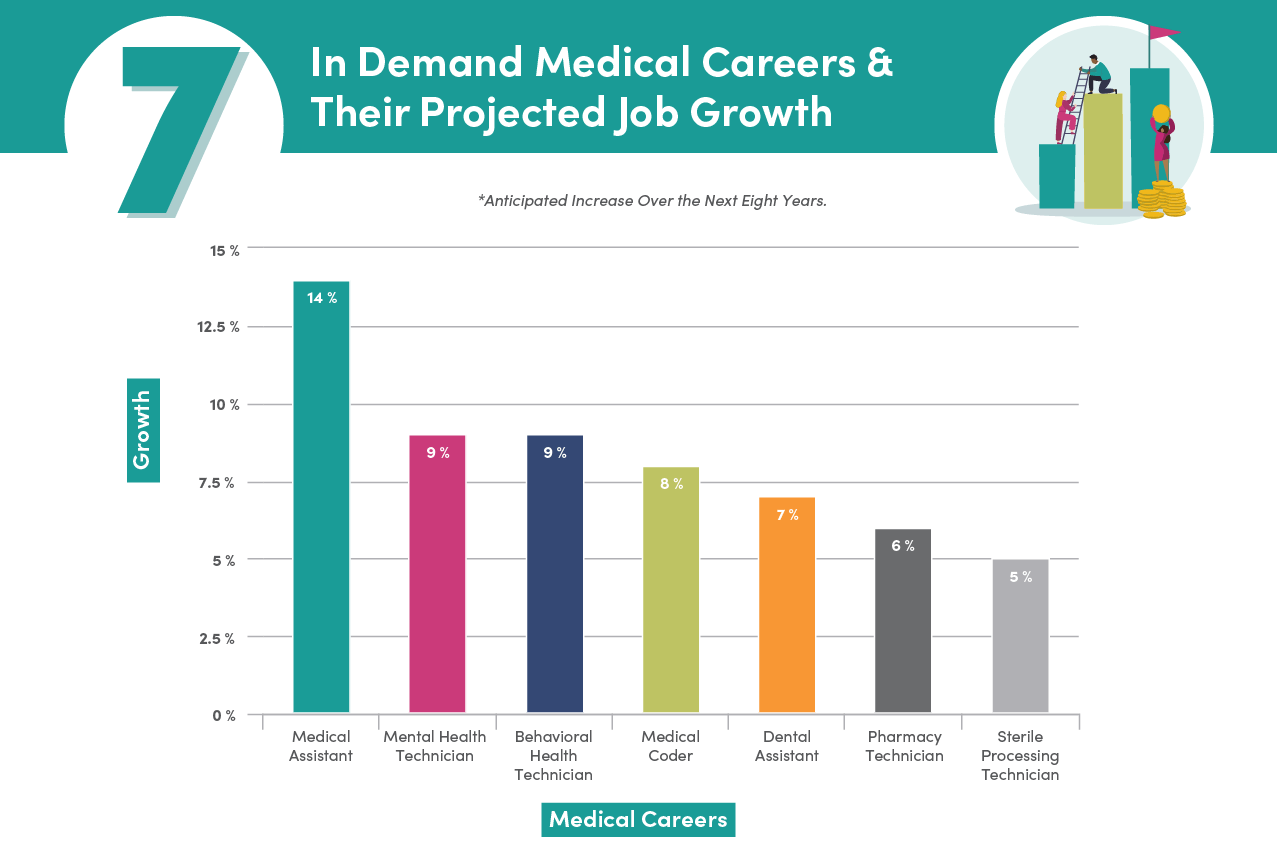7 Medical Careers in Demand (That Don’t Require a Degree)
Posted on 05.03.2024
Laura Amendola min read

The medical field is a rewarding one. With a plethora of careers to choose from, there’s something for everyone interested in the healthcare world. This guide outlines some of the most in-demand healthcare jobs out there to supply you with the information you need to decide which one is right for you.

1. Medical Coder
A medical coder has a home in almost all medical facilities. They use alphanumeric codes to update and process patient files. Diana Murphy, Healthcare Programs Instructor and MSM, CPC, CPMA, CPC-I, CCA, says medical coders “love learning, puzzles, problem solving, and winning the game.”
- The average salary for a medical coder is $47,180.
- Earning a Certified Professional Coder (CPC) certification can help set you apart when applying to medical coder jobs.
- Working as a medical coder requires a lot of time sitting at the computer with little patient interaction.
- This field has a projected job growth of 8% by 2032.
Read more: Medical Billing & Coding Job Duties, Requirements, & Salary
2. Medical Assistant
Medical assistants’ work is both administrative and clinical. This is a job with many responsibilities, including but not limited to providing wound care, phlebotomy, answering phones, and processing health insurance.
- The average salary for a medical assistant is $38,270.
- Earning your Certified Clinical Medical Assistant (CCMA) certification may help make you more competitive.
- Medical assistants spend most of their day interacting with patients and assisting healthcare professionals.
- The job outlook for medical assistants over the next eight years is fantastic at 14%.
Read more: How to Become a Medical Assistant
3. Sterile Processing Technician
The sterile processing technician role is an important one in the healthcare field. The standards for cleanliness and sterilization are high at every medical facility, so sterile processing technicians are vital in many medical environments.
CareerStep instructor Tonya Denton, CBSPD, CST, says, “Sterile processing is vital for ensuring patient safety by preventing infections and maintaining the integrity of medical equipment used in healthcare procedures. It is the heart of the hospital; without it, surgeries could not be performed!”
- The average salary for a sterile processing technician is $45,280.
- Obtaining a Certified Registered Central Service Technician (CRCST) certification can benefit you in your job hunt.
- Sterile processing technicians are most in demand in hospital settings.
- There is a 5% projected job growth for this career.
Read more: How CareerStep Can Help You Get Hired
4. Pharmacy Technician
Becoming a pharmacy technician is a great way to enter the medical field without working in a medical office. Pharmacy technicians assist pharmacists and work with customers and patients face-to-face. Working in this field requires knowledge of medical and pharmaceutical terminology, and experience in customer service could be beneficial.
- The average salary of a pharmacy technician is $37,790.
- Earning your Certified Pharmacy Technician (CPT) certification can better prepare you for this job.
- There are several environments you can work in as a pharmacy technician, including local pharmacies, hospitals, assisted living facilities, and grocery stores.
- There’s a projected 6% growth for this career over the next 8 years.
Read more: Can You Become a Pharmacy Tech Without Going to School?
5. Dental Assistant
If working in a dental office is appealing to you, becoming a dental assistant may be the perfect career! Dental assistants perform many duties through their day, such as sterilizing instruments, managing office records, taking dental impressions, and scheduling and confirming appointments. They help keep the dental office running.
Jaime Nguyen, MD, MPH, MS, and Director of Healthcare Programs at the Penn Foster Group, sheds some light on the certification for dental assisting: “The CDA certification is one of the most common ways to earn a dental assisting certification. Since it is a national certification, many states recognize the CDA certification and CDAs may practice in any state that accepts the dental assisting certification, which makes this credential more transferable. To advance to becoming a registered dental assistant, some states require dental assistants to first become CDAs before they can pursue state licensure.”
- The average salary of a dental assistant is $44,820.
- While not mandatory everywhere, some states require you to have a Certified Dental Assistant (CDA) certification under your belt to work as a dental assistant.
- Dental assistants may do some clinical work with patients, dentists, and other dental staff, depending on the regulations in their state, but generally focus on more administrative tasks.
- Job growth for this career is 7% over the next eight years.
Read more: Entry-Level Dental Assistant Job Preparation List
6. Mental Health Technician
Becoming a mental health technician can be a rewarding path to follow in the healthcare field. The demand for mental health workers only continues to grow as the stigmas attached to prioritizing mental health shrink. These technicians work with patients who have developmental disabilities or mental conditions and therefore must have a lot of on-the-job patience.
- The average salary for this job is $37,330.
- It can be beneficial to obtain your American Association of Psychiatric Technician Level 1 (AAPT-Level 1) to be better prepared for all the job entails.
- This job can be physically demanding, but can be fulfilling to know you’re making a difference in someone’s life.
- This career is projected to grow 9% by 2032.
7. Behavioral and Health Technician
Like mental health technicians, behavioral and health technicians work very closely with patients who need help with issues they are having mentally rather than physically. Their patients include those with behavioral disorders. They observe and listen to patients and can even diffuse potentially dangerous situations as part of their job duties.
- The average salary for a behavioral and health technician is $37,330.
- Earning an American Association of Psychiatric Technician Level 1 (AAPT-Level 1) certification is best when seeking out this career to ensure you are prepared.
- There’s potential to work from home when employed as a behavioral and health technician.
- This career has a 9% projected job growth rate over the next eight years.
Choose the medical career that’s right for you
With so many healthcare jobs in demand, you can decide which one is the best fit for you! Whether you want to work heavily with patients or prefer a behind-the-scenes job, you can find what you’re looking for in the medical world. Explore your healthcare certification options and get started on the road to a meaningful career.
